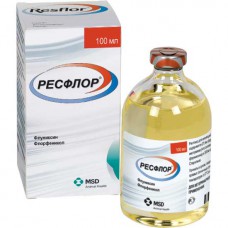Expiration date: 01/2026
DESCRIPTION
Resflor - a drug in the form of a solution for injection, intended for the treatment of diseases of bacterial etiology and relief of inflammatory processes in cattle.
Resflor in appearance is a clear, oily liquid of light yellow color.
STRUCTURE
Resflor as an active substance in 1 cm3 contains 27.4 mg of flunixin meglumin (which corresponds to 16.5 mg of flunixin) and 300 mg of florfenicol, and as excipients-N-methyl-2-pyrrolidone, propylene glycol, citric acid anhydride and polyethylene glycol.
SPECIAL INSTRUCTIONS
Bottles without labels, with an expired expiration date, with a violation of the integrity of the closure, subjected to freezing, with a changed color and / or consistency of the contents, containing foreign impurities, as well as not used within 28 days after opening, are prohibited.
STORAGE
Store the medicine in the closed packaging of the manufacturer, in a dry place, protected from direct sunlight, separate from food and feed at a temperature of 2 ° C to 25 ° C. The shelf life of the medicinal product, subject to storage conditions, is 2 years from the date of manufacture. After the first opening of the bottle, the drug is stored for 28 days.
PHARMACOLOGICAL PROPERTIES
Flunixin, which is part of the drug, is a non-steroidal anti-inflammatory drug with a pronounced analgesic and antipyretic effect; it is a non-selective inhibitor of cyclooxygenases (COX1 and COX2), which reduces the production of prostaglandins E2. A decrease in the production of inflammatory mediators causes analgesic, antipyretic and anti-inflammatory effects of flunixin.
Florfenicol, which is part of the drug, is a derivative of thiamphenicol, in the molecule of which the hydroxyl group is replaced by a fluorine atom. The mechanism of action of the antibiotic is to bind to the ribosomal subunit 50S in the protoplasm of the bacterial cell and block the enzyme peptidyl transferase, which leads to inhibition of protein synthesis in bacteria at the ribosome level.
Florfenicol is active against bacteria that produce acetyl-transferase and are resistant to chloramphenicol.
Florfenicol has a wide spectrum of antibacterial action against aerobic and anaerobic, Gram-positive and Gram-negative bacteria, including Pasteurella multocida, Pasteurella (Mannheimia) haemolytica, Histophilus somni, Fusobacterium necrophorum, Bacteroides melaninogenicus, Moraxella bovis, etc.
When administered parenterally, flunixin is rapidly absorbed and penetrates all organs and tissues. The maximum concentration in the blood is reached after 1.3 hours, and the therapeutic concentration in the organs and tissues of animals is maintained for 48 hours. Flunixin is 99% bound to proteins and is excreted mainly in the feces (57 %) and to a lesser extent in the urine (34%).
With parenteral administration, florfenicol is also rapidly absorbed, penetrating all organs and tissues. The maximum concentration of the antibiotic in the blood is reached after 3.3 hours, and the therapeutic concentration in the organs and tissues of animals is maintained for 48 hours.
According to the degree of exposure to the body, Resflor is classified as a moderately dangerous substance (hazard class 3 according to GOST 12.1.007).
INDICATIONS
Resflor is used to treat respiratory diseases in cattle, such as rhinotracheitis, bronchitis, bronchopneumonia, pleurisy caused by Pasteurella (Mannheimia) haemolytica, Pasteurella multocida, Histophilus somni, as well as other infectious diseases of bacterial etiology caused by microorganisms sensitive to florfenicol, and secondary bacterial infections that manifest themselves against the background of viral respiratory pathology.
APPLICATION
Resflor is administered subcutaneously in the neck area once, at a dose of 40 mg of florfenicol and 2.2 mg of flunixin per 1 kg of animal weight (which corresponds to 2 ml of Resflor per 15 kg of animal weight). If necessary and with a chronic course of the disease, repeated administration of Resflor after 48 hours is allowed.
It is not allowed to use low dosages due to a decrease in therapeutic effectiveness.
In connection with a possible pain reaction, you should not inject more than 10 ml of the drug in one place to cattle, and also mix it in one syringe with other drugs.
CONTRAINDICATIONS
Resflor should not be used in animals with hypersensitivity to the components of the drug, with pathologies of the heart, liver, kidneys, in cases of hypovolemia, with the risk of gastrointestinal bleeding.
The drug should not be used for pregnant and lactating cows, calves younger than 6 weeks of age, as well as for producing bulls.
It is forbidden to use Resflor simultaneously with other non-steroidal anti-inflammatory drugs and corticosteroid drugs due to the increased risk of ulceration in the gastrointestinal tract of animals.
SIDE EFFECTS
Slaughter of cattle for meat is allowed no earlier than 64 days after the last administration of Resflor. The meat of animals forcibly killed before the expiration of the specified period can be used for feeding fur-bearing animals.
SAFETY PRECAUTIONS
When working with Resflor, you should follow the general rules of personal hygiene and safety, provided for when working with medicines.
It is forbidden to use empty vials from under the drug for household purposes.

